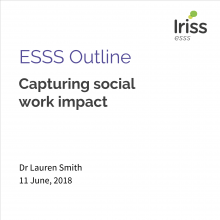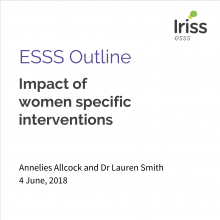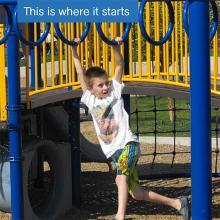Dr Louise Hill speaks about a qualitative research study she was involved in with children and young people affected by parental alcohol problems.
The research was a PhD study completed at the University of Edinburgh with Barnardos. It focuses on children's views and experiences of living with parents with an alcohol problem.
Around 65,00 children and young people in Scotland are living with a parent or carer with an alcohol problem. The study involved researching the views and experiences of 30 young people and children across Scotland, from 9-20 years old. The study began with two groups, called good ideas group, who developed ideas about how to conduct the research. The children and young people talked about the importance of choices in terms of the research process, they asked not to be made to talk or to be asked difficult questions directly, but instead to be given a range of ways to communicate.
The research identified that children and young people know a lot about parental alcohol use: such as how it affected behaviour, how much was being consumed, different patterns of drinking. They talked a lot about the emotional impact of parental alcohol problems, and how this was the biggest impact: emotions were identified such as worry, fear, anxiety. Many of the children explained that they tried to make themselves invisible, they didn't want friends or teachers to know. For some of the children they talked about how angry the alcohol problem made them, and the lack of understanding about this. Many of the children were concerned about being bullied if the parental alcohol misuse was known and they tried carefully to ensure that people didn't find out. Trusted adults, such as grandparents, older siblings and teachers, were identified as important. In terms of engagement with professionals there was concern about staff turnover amongst the children and young people, and the damage caused by having to tell their story again. An important point for the young people was that staff should try to get to know them (the child or young person) first, and build up a relationship, then they would be more likely to feel comfortable about talking about any parental alcohol problem.
Further information on this research
- Hill L, Children living with parental drug and alcohol misuse (PDF) - briefing paper.
- A PowerPoint presentation given at a SCCPN child protection seminar, entitled, "It takes big courage": children and young people talk about living with parental alcohol problems and seeking support, is also attached.
The research study that I would like to tell you about is called 'Revealing Lives' - a qualitative study with children and young people affected by parental alcohol problems. This was a PhD study that I completed at the University of Edinburgh with Barnardo's Childcare organisation, and I used to work for Barnardo's as a researcher and this was a piece of work that was kind of developed along the way and in discussion with services.
So the study came about because we were particularly interested in what children and young people's experiences and own views were really about living with parents who have significant kind of difficulties with alcohol and we were interested also in their support needs. Now we know that around 65,000 children and young people in Scotland are living with a parent or carer who has an alcohol problem - and I use the word 'alcohol problem' because I did a lot of work with children and young children around the language they wanted to use to describe their own experiences. And in many ways we talked about lots of different terms, and they ended up saying "well actually for us it's a problem in our lives, so we'll call it an alcohol problem". So that's kind of the approach that we took within the study.
So the study was a qualitative research study involving 30 children and young people across Scotland. They were recruit via 13 different voluntary organisations, and the youngest in the study was 9 and the oldest was 20. The study began with 2 different groups called the 'Good Ideas Groups. And the purpose of the Good Ideas Groups was to involve children and young people who directly had experience of parental alcohol problems, to talk to them about their ideas of how to conduct this research study. Now I was really interested in a participatory research approach and felt "well we know that this is a topic that is really quite difficult and we know it's a difficult issue for children and young people to talk about, we know that there can be a lot of family secrecy, we know there is a lot of stigma associated with it. So how do I work in a way that respects children and young people's involvement and participation and respects of using experiences in a really kind of positive light", I suppose. So what was really interesting was to develop these groups with Barnardo's, and we worked together on a four week programme and we considered "well what is research", and "how do you research sensitive topics"? And we did a lot of work together, and young people in those groups shared lots of ideas and it was a really rich experience as a researcher. I learned an awful lot. And they shared a lot of ideas with me on ways of conducting the research which then allowed me to kind of go on and speak to many more children and young people.
The children and young people talked about the importance of choices, and one of the important things they said to me was "don't make us talk - don't ask us direct questions about what's it like living with Mum who has got a problem with alcohol". So what they said was "give us lots of different ways and we will tell you in the ways that we want to". And that was really powerful for me, and really important to provide those choices in all of the research contexts. So one of the things I did was used a Choices Card - and when I met with children and young people to talk about the research, even just to explain it to them in the first stages, to make a decision whether or not they want to participate in the study - they would talk about the use of this kind of Choices Card to decide what activity they wanted to do. So one of the activities that many of the young people did was "all about me" - and that was a way of saying "just tell me about yourself". So we used a card and it had a picture or drawing of them in the middle and they would have arrows coming off. And they would tell me things like what football club they supported and how many pets they had. And they might say who is in their family or where they were living at the moment, or they might not because that was their choice, how much they wanted to share. So that was one of the activities that we did. Another activity was the shape of an alcohol bottle - and when we discussed this with the young people they felt that that was a really important way that you could choose what you could share about alcohol. So a few of the young people talked about alcohol in terms of their own experiences of alcohol, but many of them used that alcohol bottle to talk about what it was like to live with someone who had a problem with alcohol - and a lot of rich findings kind of came out of that work. But what was important for me was that was an activity that the young people themselves could, I suppose, choose whether or not to draw or to write, or how much they wanted to do. They could change the subject if they wanted, they could do another activity if they wanted. So that was a really interesting way to share as little or as much of their experiences as they wanted to. So they knew what the research study was about, what we were keen to explore, but they knew that they could opt in, but also opt out at different stages - but also, opt back in again. So ... and that's really important, because we know that sometimes that you might have gone onto a topic, or they sometimes felt ... maybe they had said something, and then they just needed a little bit of time, a little bit of a break from it. So I liked to develop the research in a way that just allowed different kinds of, I suppose responsive spaces for children and young people. And what I think is really important in making a connection about how we work as researchers is that a lot of the tools that we use, but also in trying to develop those kinds of spaces for children and young people is really important for practitioners as well - because we know from practitioners that this can be a really difficult topic to talk about.
So in terms of what some of the key findings are, firstly the children knew an awful lot about parental alcohol use and problematic use. They knew an awful lot in how it affected parents, how it affected their behaviour. They knew an awful lot in terms of quantities of what parents drank, and what types of things they drank and different patterns of drinking. So what came through from the study was that some of the children and young people were living in families where, say Dad might not drink for 3 or 4 days and then drink for 7 days and the family maybe wouldn't know where they were - which was a time of real anxiety of the children and young people when Dad was maybe away, as they would say "on a bender". But also, it was a real anxiety when he wasn't on the bender, because one of the young people said to me, you know, "I would be sat at school and I would kind of actually scratching the desk - I would be so worried that that day when I got home was when Dad would be drunk and potentially not in the house". So I think some of those issues around the complexity around different drinking patterns and around how that impacts on family life, the children were very reflective on what that meant for them. So they knew a lot.
We know from other research studies that most children and young people have a knowledge about alcohol in families from around the age of 5 or 6, and we certainly think that children in families where there is some problematic use of alcohol or drugs would be a much younger age than that. So firstly I would say they knew an awful lot. Secondly, what they talked to me a lot about was emotional impact - much more so than the practical impact on their lives. And I say that from the point of view that we know some things, particularly around kind of young people that we see in a caring role, of what they actually have to do ... what they physically have to do in families for parents and carers. Whereas this group of young people, they talked a lot around "actually sometimes I don't mind making tea, you know, and I don't mind having to take my little sister to school". And we might kind of think about how we support that - it's not always saying that that's fine. But what they said is the biggest impact was the emotional impact of living with it - so the worry, the fear, the anxiety that a lot of them felt, which was very striking across the age groups and across boys and girls. They did talk about how they shared their emotions at times. Quite a lot of children in the study spoke about they just try and make themselves invisible, you know, they would try and not draw attention to themselves, and particularly at school they would say "I would just be really quiet - I just won't say anything" - they would withdraw into their shell, we could say, so that they didn't want any attention, they didn't want friends to know about what was going on in the family and they didn't want teachers to know. So that was one of their experiences. For other children, they would talk about "it makes me so angry that sometimes", you know, when they get to school, "that this kind of anger has to come out", you know, and they just felt that they really wished that teachers in particular they talked about had maybe a greater understanding of why sometimes they found it really hard, like with their behaviour, you know, why they kicked the chair and walked out of the classroom. Because they talked about it almost as "it bubbles over", you know, their experiences could bubble over. So that was kind of quite hard for a number of the children and young people.
The other thing that came out as something that mattered to them was the issue of stigma and of feeling different. And they would talk about this in terms of many of the children were very concerned about being bullied if parental problematic alcohol abuse was known. And some of the children gave direct experiences of this and said what happened, that they had names ... you know, they were called names in the community or people wouldn't be friends with them anymore. So they had that experience. But a lot of the children and young people spoke about that they didn't think that people knew, so they tried very carefully to preserve that. So they would maybe not invite friends to come home with them, so that they wouldn't see what at times was going on in the family, or that they sometimes wouldn't exactly say maybe what they had done for the weekend, or that they would maybe kind of say that they had done something, like they were out on their bike and things and had a lovely time - whereas actually some of the children would say that their experiences were quite different than that at the weekend. So there is an awful lot around how they tried in different ways to make sure that people didn't have an awful lot of knowledge about their lives.
I should say as well though, that what was very important for many of them is that if they did have a trusted adult that they could talk to about it, grandparents were frequently mentioned, elder siblings were really important, and often sisters who no longer lived in the family home, that they would go and spend time with and talk about. For some of them it was a teacher - guidance teachers were sometimes mentioned. Some would mention a social worker, and some would, obviously through their voluntary projects, have really good relationships with the project workers. But one of the things that they found really hard was that they mentioned kind of staff turnover - and I was quite surprised at their level of knowledge around this - but they would talk to me about "well you tell them your story and you feel like they know you, and you don't have to ... when something happens you don't have to go in and tell them all again - and then that person leaves, and then you have someone else you have to do the same thing to". And for some young people, it maybe got to a stage where that was becoming a very hard process, that they were saying things like "well it's easier not to do it - because I tell them and, you know, they want to build up these relationships with me and I end up, you know, they leave and then I end up feeling as if I've been let down". So consistency of staff they felt was really an important factor that would allow them to trust. And I think in terms of thinking about how that works for practitioners - that we need to be really sensitive to young people's historical experience of engagement with services. So if they have had relationships like that in the past and then that person has left or they have not been able to access that service any more, or they have moved from primary school to secondary school so that trusted teacher isn't there anymore - then that can leave an awful lot of anxiety for them, and they might then make a decision not to talk any more or not to trust another person. So I think that can be overcome, and the young people themselves had lots of ideas of how that could be overcome, and lots about kind of not being forced to talk, take time to get to know us, and to get to know us as who we are as people, not just what Mum's drinking is like at the moment, or grandad's ... you know, so I think that that was really important point for them, as in "once you get to know us, then we can develop the relationship and then I might share things about my family". And I recognise that that can present huge challenges at times for practitioners, and it depends what kind of roles practitioners are in to be able to do that. but it was really an important point for the young people.








